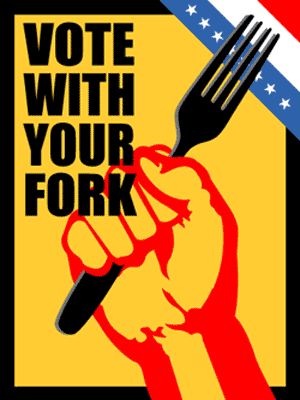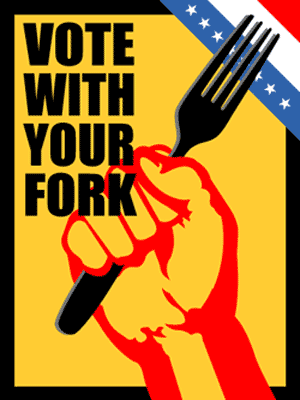 (Watershed Media)In what is ostensibly a five-book review for the June 10 New York Review of Books, journalist Michael Pollan has an epic essay charting the emergence and character of the food movement. Or, as he puts it, “movements.” They are unified, for now at least, by little more than the recognition that industrial food production is in need of reform, “because its social/environmental/public health/animal welfare/gastronomic costs are too high.” (Pollan, of course, has been indispensable to the rise of this movement, even though he omits his 2006 best-seller, The Omnivore’s Dilemma, from his list of its catalysts — among them Eric Schlosser’s Fast Food Nation and Marion Nestle’s Food Politics.)
(Watershed Media)In what is ostensibly a five-book review for the June 10 New York Review of Books, journalist Michael Pollan has an epic essay charting the emergence and character of the food movement. Or, as he puts it, “movements.” They are unified, for now at least, by little more than the recognition that industrial food production is in need of reform, “because its social/environmental/public health/animal welfare/gastronomic costs are too high.” (Pollan, of course, has been indispensable to the rise of this movement, even though he omits his 2006 best-seller, The Omnivore’s Dilemma, from his list of its catalysts — among them Eric Schlosser’s Fast Food Nation and Marion Nestle’s Food Politics.)
This collection is a “big, lumpy tent,” says Pollan:
Where many social movements tend to splinter as time goes on, breaking into various factions representing divergent concerns or tactics, the food movement starts out splintered. Among the many threads of advocacy that can be lumped together under that rubric we can include school lunch reform; the campaign for animal rights and welfare; the campaign against genetically modified crops; the rise of organic and locally produced food; efforts to combat obesity and type 2 diabetes; “food sovereignty” (the principle that nations should be allowed to decide their agricultural policies rather than submit to free trade regimes); farm bill reform; food safety regulation; farmland preservation; student organizing around food issues on campus; efforts to promote urban agriculture and ensure that communities have access to healthy food; initiatives to create gardens and cooking classes in schools; farm worker rights; nutrition labeling; feedlot pollution; and the various efforts to regulate food ingredients and marketing, especially to kids.
Yep, that about covers it. And those factions don’t always play nicely together. For example, animal-rights activists can’t abide what I like to call the “born-again carnivores” — the people (like me) who used to be vegetarians but resumed eating meat once they could get it in good (or at least better) conscience from small farms.
Pollan finds one common point on which all the various movement splinters can agree: that the way our food system is organized and supported in this country has led to an epidemic of ill health. First Lady Michelle Obama’s various forays into food politics shows just that there is awareness of that fact occurs in very high places. But the food movement isn’t just about tearing down the unhealthy, unfair, and unclean industrial food system, says Pollan. It’s also about celebrating the communal and gustatory pleasures of its opposite — and that’s what makes the food movement so appealing. Farmers markets aren’t just outlets for organic kale; they’re the new informal gathering places to meet and make friends. They make food shopping fun again, no longer a grim sprint behind a cold metal cart through aisles of corporate logos.
In the final part of the essay, while discussing political scientist Janet A. Flammang’s new book, The Taste for Civilization: Food, Politics, and Civil Society, Pollan takes aim at a favorite target: the corporate message that cooking is a chore and convenience food can rescue us from it. Fast food and convenience food, writes Flammang, along with other tactics to denigrate “‘foodwork’ — everything involved in putting meals on the family table,” have wrecked the critical social institution of the family meal, and other important food rituals, such as the breaking of bipartisan bread that used to occur in the Senate dining room.
Reclaiming cooking and communal eating as worthy societal activities are just two goals the various factions of the food movement can agree on. They’ll need to find more common ground if they hope to persuade politicians — and the rest of the country — that theirs is a cause worth backing.




